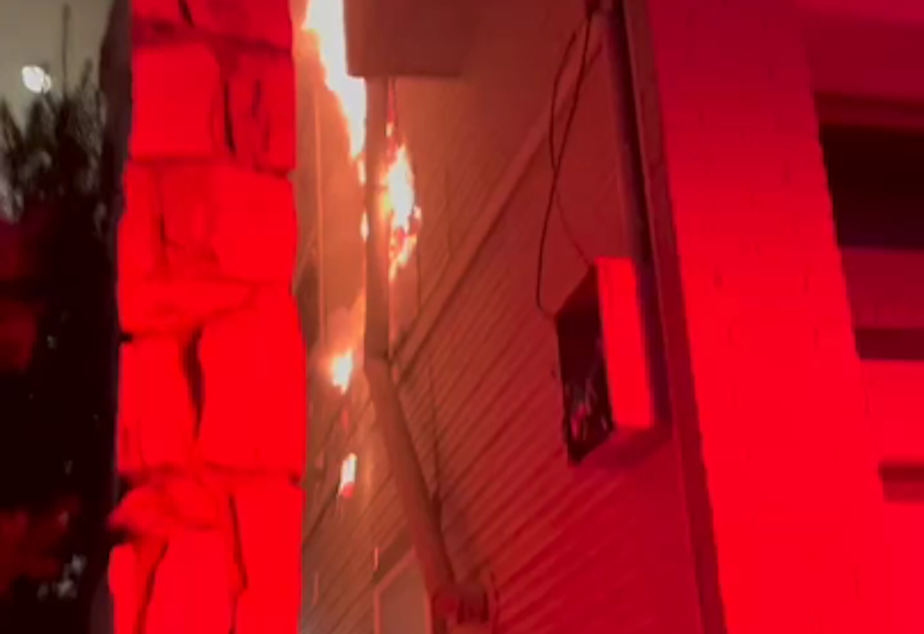Sign here to avoid eviction but beware: You might be signing away your rights

Landlords say it’s a useful tool. Renters call it a predatory trick. This legal document seems like an easy way to avoid eviction, but it can backfire for tenants. Many don’t know what they’re signing away.
A few months ago, Pete Best jolted out of bed before dawn, gasping for breath.
The unit across from his was on fire, and his apartment was filled with smoke.
“I just started banging on doors,” Best said.
He ran out onto the street.
“The first breath of air was beautiful,” he said.

 14 secs
The Audrey apartments in Fremont burn on Feb. 25, 2022.
14 secs
The Audrey apartments in Fremont burn on Feb. 25, 2022.
Everyone got out OK but their homes at the Audrey apartment building in Fremont were uninhabitable.
What came next was even worse, former resident Ben Russell said.
“We just had our homes destroyed by a fire, now we've got to play this game with these people who are trying to screw us over at every turn,” he said.
These people, meaning their property managers who emailed them a document a few days after the fire. If the renters signed it, they could get out of their lease – under certain conditions.
Tenants would agree to release their landlord from liability, collect all their possessions in the next few days, and promise not to say anything bad about their landlord, ever. No bad Yelp reviews, no critical tweets.
Sponsored
In exchange the landlord would let renters out of their lease and return their deposits immediately.
The "settlement agreement" presented to tenants
This agreement is one form of what's commonly called a "Mutual Termination Agreement"
This kind of document is usually called a "Mutual Termination Agreement."
Alex Nicewander lived in the building, too.
“They called it a settlement agreement, which I thought was hilarious,” he said.
Sponsored
Hilarious as in, Are you kidding me?
Seattle Property Management Associates runs the building and declined to comment for the story.
"The first thing that I noticed is, this is a bad deal,” said attorney Edmund Witter, who saw a copy of the document.
Witter works at the King County Bar Association’s Housing Justice Project, which represents renters facing eviction. The attorneys there often see people who got evicted because they signed an agreement like this.
It’s a bad deal because the agreement makes tenants forfeit important legal rights.
Sponsored
“You've had your house burned down, you've lost a lot of your things, you are entitled to some protections, and a landlord is supposed to help you relocate and pay you money under both city and state law,” Witter said. “This agreement would effectively waive your right to be able to collect any of that.”
That could be thousands of dollars – plus the ability to sue and maybe get even more. And, by the way, landlords have to give you back your security deposit anyway.
Of course, sometimes renters would benefit from an agreement with their landlord to get out of a lease early or avoid an eviction.
“But the thing is, it's tricky,” Witter said. “A lot of times when people end up being asked to sign these, there’s a lot of pressure.”
It’s a scary choice, if you don’t know the law – sign now or we’ll evict you.
Sponsored
“So that tenant will just sign that mutual termination agreement, maybe get an extra couple days to basically get all their things out,” Witter said. “And they've waived any of their rights to defend themselves in court.”
But the tenant may have not realized they actually had other rights – like paying overdue rent in installments and keeping their place – or getting two weeks to move out.
One other little detail – even if there is no legal reason to evict a tenant, if they sign an agreement saying they’ll move out but don’t leave, the landlord gets an automatic legal reason for an eviction.
KUOW reviewed court filings in half a dozen eviction cases involving mutual termination agreements. One case concerned domestic violence survivors in transitional housing. Another case was a renter who signed the agreement even though he couldn’t read because of brain damage from a head injury. And finally, many cases involved people who were living at affordable housing providers and became homeless after they signed a mutual termination agreement.
Compared to the formal eviction process, mutual termination agreements are a quicker, easier way to get a renter out. You can even download a template online from a Seattle law firm that represents property owners in eviction proceedings.
These agreements are good for landlords. Necessary, even, says attorney Chester Baldwin, who advocates on behalf of landlords and the rental housing industry in Olympia.
He says the eviction moratoriums and a bunch of new state laws in recent years make it hard for landlords.
“The reason that mutual termination agreements exist is because they’ve made it so difficult for a housing provider to be able to work their way through the court process,” Baldwin said, “and be able to get a tenant who has not paid rent or who is causing problems or who has committed crimes, out of their unit.”
Recently the Legislature limited the reasons you can evict someone, mandated that landlords give tenants more time to pay overdue rent or leave, and offer repayment plans for overdue rent accrued during the pandemic.
Mutual termination agreements are a backstop so landlords can rent to riskier tenants, Baldwin said.
“Mutual termination agreements, I think are mutually beneficial in situations where you have significant barriers to housing," Baldwin said, "because otherwise, no one's going to take a chance on that person.”
A few weeks after the apartment fire, Pete Best helped a buddy pack up and move out.
The tenants of Audrey apartment building banded together, got legal advice, and didn’t sign the mutual agreement documents. Best said it wasn’t worth it to get his security deposit sooner.
“I would much rather eat that $1,000 than sign away any rights to speak freely about this, to act freely on this,” Best said.
The restaurant where he works raised money for him, and he moved to a new place, in a different neighborhood.
“Without them, I would be couch-surfing and relying on good faith and good fortune from the people around me,” Best said. “I didn't have savings for this.”
The tenants are still waiting for relocation assistance money and to learn the cause of the fire.
Depending on what happens, they may be the ones to take their landlord to court.
If you’re a tenant and want to get out of a mutual termination agreement you signed, only a few places in Washington have laws letting you.
Under Seattle Municipal Code 22.205.120, You can send a written notice to the landlord within ten business days of signing the agreement. You can still send the notice after ten days have elapsed if you didn’t have a lawyer, advocate, or mediator present when you signed.
Under Federal Way’s Revised Code 20.05.080(5), “A landlord may not coerce a tenant to sign a mutual termination agreement.”
The process to get out of one in Federal Way is similar: tenants can rescind a mutual termination agreement by sending notice to their landlord either within ten days or afterwards if the tenant can show they “improvidently entered into the agreement.”
In unincorporated King County, county Code 12.25.080 prohibits landlords from taking advantage of a tenant’s lack of understanding of their lease or legal rights.




